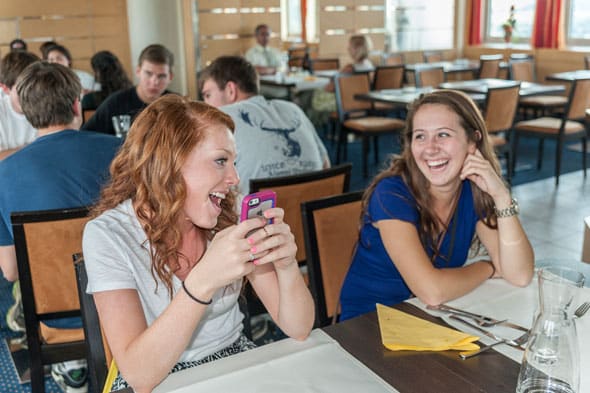Helping Teens Curb Screen Addiction

Your teen has seen it all—Paris, Rome, Buenos Aires, Sydney—on YouTube. He’s connected with people all over the world—on Facebook. She’s become a bit of an expert on nature photography—on Instagram. Too many teens are seeing the planet exclusively from their screens, whether it’s the big screen (computer), the medium screen (tablet) or the little screen (smartphone). Teenagers today are a paradox in that they are constantly connected but they seem to be far less physically engaged in the world around them. How can parents fight against what feels like a losing battle to apps and videos? Travel can be a powerful antidoteto screen addiction among teens, experts say.
Even just the simple act of removing teens from their everyday environment can cause them to put down the screens in a way that would be difficult when they’re at home, says Dr. Rick Meeves, a Utah-based therapist who works for Outback Therapeutic Expeditions.
“When teens are in the ‘comfort zone’ of familiar surroundings, they start to tune out the details of their lives,” says Dr. Meeves, a Ph.D. in Marriage and Family Therapy who specializes in teen issues. “In a familiar environment, teens lose sight of the intricacies of the world around them. Having lost the joy of discovery of their pre-adolescent years, teens look to screens to provide a distraction from their increased responsibilities.”
As teens see new places and new people in real life (not just how they look on Facebook), they may realize that their electronics are a luxury that not everyone has. But perhaps more importantly, they may understand that high-quality human interaction is better than even the iPhone5S, explains Dr. Jessie Voigts, who has a PhD in international education and runs wanderingeducators.com, a global community of educators sharing travel experiences.
“Travel can show teens the world and also show the great disparity of privilege,” says Dr. Voigts. “Often, being in a location where people have less can make a traveler learn more about themselves and what can make them happy. Playing soccer in a park with kids whose passion is soccer can be life-changing. Those kids might not have a computer (or a phone!) in their family, but their lives are full and rich. By connecting with others when we travel, we not only expand our worldview, but we also learn and recognize what is important: that human connection.”
When they are traveling, teens may also crave a connection with their friends back home that aren’t lucky enough to be on the trip. And it’s totally normal that they will want to share their experiences on social media, which can be a minefield for a screen-addicted teen. But with a little guidance from adults, they should do just fine, says Voigts, who runs a teen travel blogging program that teaches teens how to capture their travels in words, photos and videos.
“Talk to your teens and explain how important it is to be in the moment, experiencing things, rather than sharing things,” Voigts says. “If you are to truly experience something, sharing comes after, not during. Yes, take the photos, and the videos, and then join in whatever is going on. Share those experiences back on the bus or in the hotel room. And adults need to be a good role model in limiting their own screen time and social media while traveling.”
The very nature of travel may limit teen’s access to their screens—they’re out all day, reduced connectivity and battery power. But when the teen returns home, old screen habits may emerge if parents aren’t vigilant. Dr. Meeves offers some great tips for parents who want to make sure that the progress the teens made while traveling doesn’t vanish a few days after they arrive home.
“Beyond mindfulness in the moment, the next most critical aspect of life is one’s authentic relationship with others,” says Dr. Meeves. “Social media should be evaluated not just for content, but also for intent. Why are we sharing this particular content? Are we showing off and competing with our peers, or are we sharing our wonder and joy with those we love? In short, are we using social media as a tool to authentically connect with others, or as a way to project a false self-image? When we approach social media with the right intention, we can understand it for what it is: a luxury, sure, but also a single tool in our array to improve our quality of life.”
“We need to take this same approach to parenting about screens. By sticking to this principle, we can help our children prioritize their screen use, and even more importantly, give them a true ‘reason’ behind the limitations and rules that we set.”
Written by Liz Borod Wright, freelance writer and founder ofwww.travelogged.com












